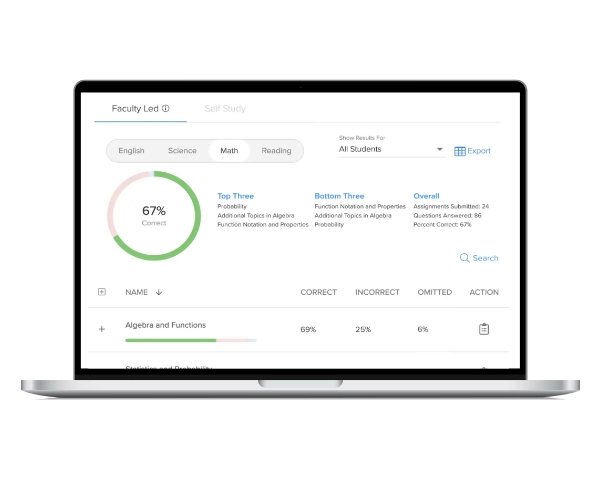Before you register for the NCLEX® or deep dive into exam prep, you need to know whether you’re actually eligible to take the test — and if anything might stand in your way. Let’s break down all the NCLEX requirements, how they vary by state, and what extra steps apply if you’re an international nurse. We’ll also share the common roadblocks (such as documentation, background checks, or Social Security Number requirements) so you can avoid last-minute surprises and move confidently toward your exam day.
Who Is Eligible to Take the NCLEX Exam?
Hold off on scheduling your exam — first, you need authorization from a Nursing Regulatory Body (NRB), typically your state board of nursing. Here's how to know if you meet the core requirements:
1. Core Educational Foundation
To qualify for the NCLEX, you must graduate from a state-approved or accredited nursing program. This could include programs such as:
- Associate Degree in Nursing (ADN)
- Bachelor of Science in Nursing (BSN)
- Nursing diploma programs
Note: If you’re unsure whether your program qualifies, check with your state’s BON or your school’s program director.
2. Apply for Licensure Through a Nursing Regulatory Body
Each state or jurisdiction has its own licensing authority. To begin the process, you’ll need to:
- Submit an application for licensure to your NRB (usually includes a fee)
- Provide official transcripts and government-issued ID
- Complete a criminal background check (required in most states)
3. Meet Additional NRB-Specific Requirements
Some states add extra steps to their approval process, such as:
- Fingerprinting or live-scan background checks
- Notarized documentation to verify identity and education
- Proof of English language proficiency (especially for international graduates)
4. Understand the NCLEX Eligibility Window
After your NRB approves your application and you register with Pearson VUE, you’ll receive an Authorization to Test (ATT) via email. This document contains your validity dates (typically valid for up to 90 days). If you do not test within this period, you’ll need to re-register for the NCLEX.
Differences Between NCLEX-RN and NCLEX-PN Eligibility
The eligibility process for both exams is similar, but the type of education required depends on whether you’re pursuing RN or PN licensure.
| Requirement | NCLEX-RN | NCLEX-PN |
|---|---|---|
| Degree | ADN or BSN | Diploma or Certificate in Practical Nursing |
| Scope of Practice | Registered Nurse | Practical/Vocational Nurse |
| Program Duration | 2-4 years | 12-18 months |
| Eligibility Process | Apply to NRB & register with Pearson VUE | Apply to NRB & register with Pearson VUE |
NCLEX Requirements by State: Key Differences
While the National Council of State Boards of Nursing (NCSBN) sets the standard for NCLEX eligibility, each state adds its own layers.
Why State Requirements Vary
Every state follows its own Nurse Practice Act. These laws determine requirements such as:
- What type of documentation is accepted
- Language proficiency proof
- ID verification processes
- Legal/residency status eligibility
Social Security Number (SSN) Requirements
Some states require an SSN to apply for licensure, while others don’t.
States that do not require an SSN (as of 2025):
- New York
- Illinois
- Minnesota
States that do require an SSN:
- California
- Texas
- Florida
Note: Always confirm your state’s current rules on its BON website.
NCLEX Requirement Waivers
There are no state-level waivers or alternatives to the NCLEX. All nurses must pass the NCLEX to be licensed.
How to Find Your State’s Requirements
Each NRB has a website with eligibility details. You can also consult the NCSBN’s NRB directory to find up-to-date information.
International Candidates: Extra Steps to Eligibility
If you're an internationally educated nurse, the path is more involved — but absolutely doable.
Clinical Hour Requirements
If you graduated from an accredited nursing program, your clinical hours are covered. Your school provides verification directly to the NRB — no need to track these hours yourself.
English Language Proficiency
If you completed your nursing education outside the U.S. or Canada, your NRB may require proof of English fluency. Common methods include:
- IELTS or TOEFL scores
- Completion of an English-language nursing program
Note: Requirements vary, so always verify with your NRB.
Credential Evaluation Services
You’ll need to verify your academic and professional qualifications with a credential evaluation. Most NRBs accept Credentials Evaluations Service (CES) reports from:
- CGFNS International
- Educational Records Evaluation Service (ERES)
- Josef Silny & Associates
- International Education Research Foundation (IERF): limited to Canada, India, Mexico, the Philippines, and Puerto Rico
- World Education Services (WES): accepted by some states
Note: Some states only accept CGFNS reports (e.g., Utah, Illinois, Connecticut, Michigan, and Rhode Island).
Frequently Asked Questions (FAQs)
How many clinical hours are needed to take the NCLEX?
You don’t need to track them. Graduation from an accredited program satisfies this requirement, and your school handles verification. See Clinical Hour Requirements.
Which state has the easiest NCLEX requirements?
There’s no truly “easy” state, but some are more flexible for international candidates or have simpler documentation requirements. New York, for example, is often considered more accommodating.
Can I take the NCLEX without a Social Security Number (SSN)?
Yes. Certain states including New York, Minnesota, and Illinois don’t require a SSN. Others do require an SSN for licensure. See Social Security Number (SSN) Requirements.
Do eligibility requirements expire if I wait too long to test?
Yes. Your Authorization to Test (ATT) is typically valid for 90 days. If you miss your window, you’ll need to re-register and repay. See Understand the NCLEX Eligibility Window.
Is CGFNS or IELTS always required for international nurses?
Not always. It depends on the state. Some require both, some require 1 or the other, and some offer alternatives. See Credential Evaluation Services.
Read More About the NCLEX
- Understanding the exam’s structure can make all the difference. Get familiar with question formats, test length, and how clinical judgment is assessed on test day.
- Before you can test, you’ll need to register and confirm your eligibility. This includes applying through your nursing regulatory body (NRB) and receiving your Authorization to Test (ATT).
- What does it really take to pass? This resource breaks down the scoring algorithm, passing standard, and what you need to know about Computerized Adaptive Testing (CAT).
- Set yourself up for success with a personalized study roadmap. Follow a step-by-step guide to plan your prep time based on your goals and schedule.
- A clear strategy starts with knowing what to expect. Use the RN test plan to pinpoint the content areas you’ll be tested on — and where to focus your review.
- Get an edge by diving into the PN test plan. Learn how the test is weighted and which topics deserve extra attention as you prepare.



